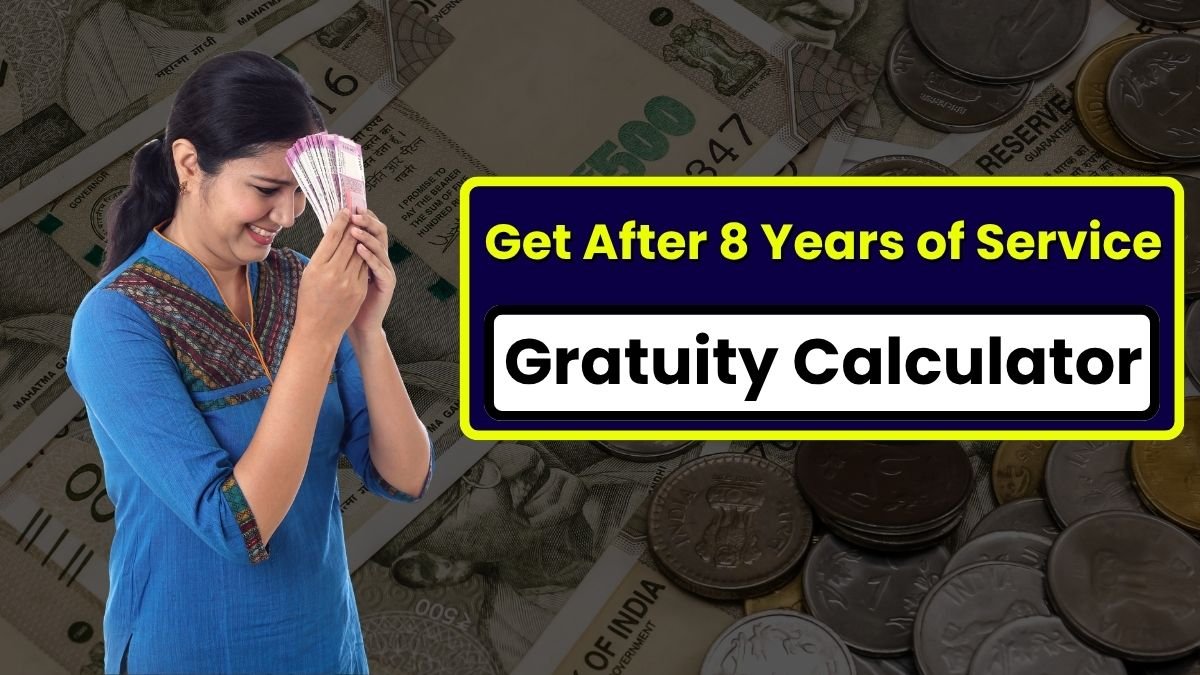If you’ve stayed with the same company for several years, you might be sitting on a surprisingly large gratuity amount without even realizing it. A lot of people treat gratuity as some vague “retirement bonus,” but here’s the thing — once you understand how it’s calculated, you can easily figure out whether you’re looking at a few thousand or a couple of lakh rupees.
And if you’ve completed eight years of service with a last drawn salary of ₹45,000, the number is much bigger than most employees expect. Let’s break it down in a way that actually makes sense.
What Exactly Is Gratuity and Why Does It Matter?
Think of gratuity as a “thank you” fund your employer builds for you over time.
If you’ve worked at least five continuous years with one company, you qualify — unless you faced a serious accident or death, where the benefit goes straight to your nominee regardless of years worked.
In simple terms, gratuity is like an emergency cushion that many people forget they even earned. When you resign, retire, or your service ends, this amount lands directly in your bank account. And depending on your salary and years of service, it can be a game-changer.
What the Gratuity Act Actually Says
The Payment of Gratuity Act, 1972, sets a clear rule:
- Maximum gratuity payable = ₹20,00,000
- Minimum service required = 5 years of continuous employment
One catch many people don’t know:
If you’ve worked 4 years and 11 months, you won’t get gratuity.
But if you’ve completed 4 years + at least 240 working days in the 5th year, some courts have considered it eligible — yet it’s not guaranteed.
And yes, any unfortunate case of death or permanent disability bypasses the 5-year rule.
How Gratuity Is Calculated (Let’s Make It Simple)
Here’s the formula used for employees covered under the Gratuity Act:
Gratuity = Last Salary × (15/26) × Completed Years of Service
Where “Last Salary” = Basic Salary + DA
And 15/26 represents 15 working days’ pay out of 26 working days in a month.
Quick Example:
If your last basic salary + DA = ₹45,000
Years of service = 8
Your gratuity becomes:
₹45,000 × 15/26 × 8 = ₹2,07,692
Yep — over ₹2 lakh, just for sticking with one company. No investment. No extra effort. Just loyalty rewarded.
Why 15/26? The Part Most People Get Confused About
Here’s how I explain it to people who ask:
It’s like saying, “For every year you worked, we’ll give you 15 days’ salary.”
But since the law considers a month as 26 working days (excluding weekly offs), the fraction becomes 15/26.
Another thing to remember:
- If you worked 7 years and 7 months, it counts as 8 years.
- If you worked 7 years and 3 months, it stays 7 years.
Those few extra months matter — sometimes by tens of thousands of rupees.
Tax Rules: How Much Will You Actually Take Home?
Here’s the part nobody enjoys, but you should know:
Government Employees
- Entire gratuity = 100% tax-free
Private Sector Employees
Exemption is available up to the lowest of these three:
- ₹20,00,000
- Gratuity formula amount
- Actual gratuity received
Anything above the exempt amount gets taxed according to your income slab.
The good news? Most employees never cross the ₹20 lakh upper limit unless they’ve worked 25+ years with a very high last salary.
Why You Should Calculate Your Gratuity Today
You don’t need HR to tell you the number.
You don’t need a special app.
Just plug your details into the formula and you’ll know exactly what you’re owed.
Once you know the figure, it becomes easier to plan your savings, negotiate your exit, or even decide whether staying another year might increase your payout significantly.
A lot of employees leave a job without realizing they lost an entire year of gratuity eligibility — don’t be that person
Frequently Asked Questions
1. Do I need to complete exactly 5 years for gratuity?
Yes, for most cases you must complete 5 continuous years. But if death or permanent disability occurs, gratuity is paid regardless of years worked.
2. Is gratuity taxable for private employees?
Partially. You get tax exemption on the lowest of ₹20 lakh, formula amount, or actual gratuity received. Anything above this slab is taxable as per your income bracket.
3. Can my employer deny gratuity after eight years of service?
Not legally. If you meet the eligibility criteria and your company falls under the Gratuity Act, gratuity is a statutory right — not a discretionary benefit.




